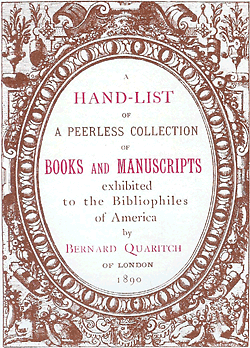
Considerable comment has been aroused among booksellers in New York City by the advent of young Mr. Quaritch of London with an assortment of old books from his father’s London repository. The two questions most discussed relate to the character and quality of what Quaritch has to sell and to the effect that such sale will have on the book trade. Concerning the first of these questions, the general opinion among booksellers here is that Quaritch has brought nothing to this country that he could sell in England.
As to the effect on the trade, a majority of the booksellers think that it will be inappreciable. James Osborne Wright, of Eighteenth Street, who is at present in charge of the Barlow library in the rooms of the American Art Association said: “Whether the experiment will be successful or not, I cannot say, for the result depends altogether on the buyers here, and there are more American book buyers who are ignorant of what they buy than those who have a knowledge of books. I am now speaking, of course, about old and rare books. New books do not enter into this question at all, and consequently the dealers in new books will not be affected one way or the other by the Quaritch movement. It is the sellers and collectors of old books who are interested in this matter. Therefore, I say, that if the Quaritch sales should be successful there might be a boom in this particular trade. Whether it will be successful or not is a question.
“The stuff that Quaritch has sent here is unquestionably good, but it is not new or rare on the market. It has been cataloged over and over again by him, and it is self-evident that if he could have sold it in England at the prices asked he would not have sent it here. It is a fact that old and rare books command better prices in England than America, but this condition is due in no small degree to American purchasers. The average American purchaser will pay more for an old book in Europe than he will in America, and the European dealer is keenly awake to this fact.
“I will give you a case in point. Some time ago, I offered a certain book for sale at £20. A collector dickered with me quite a while and finally refused to take the book at the price. Subsequently, I sold the book to an English dealer and sent it to London. My customer, to whom I could not sell the book, went to England the following summer, and when he returned he came to me one day in great glee and, producing a book, declared that that was the sort of thing I ought to deal in. I looked at the book and was astonished to find that it was the identical volume he had refused to purchase from me. He had gone to England and paid £30 for what I had offered at one-third the price. This spirit of confidence in the English dealer and this ignorance of books may help Quaritch here. Moreover, as I have said, his stuff is good.
“I have no doubt that his missals and Americana are what he represents them to be. The psalter for which he asks $26,500, will not show any profit to him, even if he should sell it at that sum. He paid nearly £5000 for it, and the interest on the sum invested will easily bring the amount up to the catalog selling price.”
Mr. Brayton Ives, the well-known book collector of this city, was present at this interview with Mr. Wright and corroborated the statement that the books brought here by young Quaritch had been frequently cataloged at the home establishment. Mr. Ives recalled that the psalter, which Quaritch offers for sale at $26,500, had cost Quaritch almost $25,000. The reason of this was not so much the value of the book but the circumstances of the sale. An agent had been sent to the sale with a large sum of money to purchase ten special books that were offered could not be obtained for the pro rata price, the money was to be expended for the remaining books. If the second could not be obtained on like terms, the plan of concentration was to be followed to the last volume, and the whole sum expended on that. Quaritch was on hand, applying his Napoleonic policy, and when the psalter was offered, he was surprised to find so much money opposing him. He kept bidding, however, and finally obtained the book, although it cost him probably near double its value at the time.
Henry Miller, the Nassau Street bookseller, was also of the opinion that Quaritch had brought to America only such books as he could not dispose of in England. He had been through Quaritch’s London stores some time ago, and had found them filled with “plugs,” a trade term for an unsalable book. Books accumulated much faster than they sold, and Quaritch had probably sent over some of his surplus stock. The movement would have no effect on the trade. This opinion was echoed by S. B. Luyster, Robert Friedenberg, D. G. Frances, and Henry L. Smith.
Mr. Smith, who is associated with the Scribners, said that young Mr. Quaritch was traveling for pleasure and had brought a collection of books with him. If he could sell them, it would be alright, and if he could not, it would be equally right. He would have his travel and his pleasure whatever the result of the sale might be. Some of the dealers held that the bindings of a great many of Quaritch’s books were more valuable than the books themselves.


